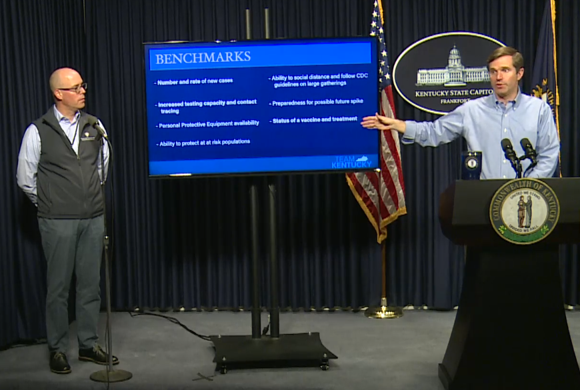State lays out reopening guidelines, but warns you may get a call saying: isolate for two weeks due to contact with infected person

Dr. Steven Stack, the state health commissioner, listened as Gov. Andy Beshear talked Friday.
—–
By Al Cross
Kentucky Health News
Some restrictions against the coronavirus in health care may be relaxed before the end of the month, and some businesses could loosen up in May, if the number of cases declines for two weeks and they show they can operate safely, Gov. Andy Beshear said yesterday.
But the governor signaled that Kentucky schools are likely to remain closed for the rest of the academic year, and that the state has a long way to go in its fight with a virus for which no vaccine is likely to be available until next year.
“I think if there is not a vaccine by this time next year, already the world will be very different” in how people work, socialize and go about in public, Beshear said. “The way we deal with this will be vastly different, and the disruption to our lives will be significantly less.”
He laid out seven benchmarks for action, the first being a two-week decline in cases. The second is increased testing capacity, starting with heath-care workers, and and contact tracing, in which public-health workers track down people who came in contact with infected people, and ask or force them and their contacts to isolate for two weeks, the incubation period of the virus.
Health Commissioner Steven Stack said the public will have to get used to this: “If you have a positive test, you’re gonna have to work on self-isolating for 14 days, having us work with you to identify the people you’ve come in contact with, and having those people self-isolate, because we’re gonna have to work very hard for quite a while ahead to contain and prevent another resurgence.”
Beshear said, “We want to start getting back to some of the things we were able to do, but at any time, somebody can test positive, then you can get a call because you were in contact with them, and suddenly, for about 14 days, life won’t be normal again.” This is part of . . . what all the health professionals say will be part of our new normal until an effective vaccine or other treatments come out.”
But such contact tracing and isolation “requires us to test at a scale that no state is able to do right now,” Stack said. That is the primary complaint now about President Trump’s handling of the crisis, that he is leaving testing up to the states and industry.
Beshear said Kentucky’s plans are “very much in line with the White House,” despite any rhetoric or tweets, an allusion to President Trump’s promotion of protests against restrictions in some states, including Kentucky. “Don’t let people try to create division there,” the governor said.
He said the White House guidelines are “a public-health document” that “is looking like we were talking about, slowly doing this as we can protect people.”
Stack said later, “When we start lifting restrictions there will be more disease,” and more risk of death. “There’s a counterbalancing need with peoples need to go on with life and people’s need to be kept safe. We’ve recognized that all along.”
The guidelines say that in the first phase of relaxation, schools should remain closed, but Beshear declined to announce that for Kentucky until he spoke with school superintendents on Monday.
He said the first relaxation could come in late April, for health-care providers, because emergency-room patients are coming in sicker because current guidelines discourage them from visiting doctors.
The next benchmark is the ability to personal protective equipment without government aid. That is essential for relaxation of health-care restrictions, such as a ban on elective surgeries that Kentucky hospitals say is costing them more than $20 million a day.
The next benchmark is the ability to protect vulnerable populations, such as people in long-term-care facilities, and the ability of hospitals to handle any surge of cases. Beshear said the state has done well at suppressing any surge, but “We are in a pandemic that we have never seen before. We have seen spikes in other states.”
Then comes the ability to keep social distance and still follow guidelines of the federal Centers for Disease Control and Prevention. That will heavily influence decisions about what businesses are able to reopen to normal trade. For example, hair salons might have to take fewer customers are at time.
“It’s gonna be a new normal in our places of work as well,” Beshear said. “Our industries are going to need social distancing, protective equipment,” and daily temperature checks of employees on their way into the workplace, plus testing, isolating and contact tracing of their own. He said his administration is working with businesses to help them reopen, but individuals must not relax their social distancing: “We’re gonna have to do it almost twice as much.”
The last two benchmarks are preparedness for a spike in cases, and the status of vaccines and treatments. “That can change the world at a moment,” he said. “That’s how we get back to something resembling our old normal.”